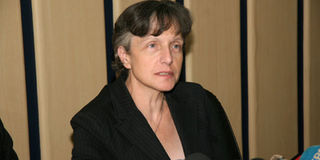Six people, not tribes are on trial, ICC tells Kenyans

Photo/FILE
ICC registrar Silvana Arbia at a press conference with ministers at Harambee House in Nairobi, September 3, 2010.
The registry of the International Criminal Court (ICC) will soon roll out a public information campaign to explain the ICC court process in a move which will be seen as an effort to ease tensions ahead of the judges’ decision.
Court registrar Silvana Arbia says her department was already informing the public about the cases in The Hague and that this would be strengthened in the months to come.
“As international criminal processes are sometimes complex, there is a need to continuously reinforce messages and clarify misperceptions arising from the process,” she told the Sunday Nation.
“The Court is in the process of establishing direct dialogue with grassroots in remote communities to listen and respond to their questions, concerns and views about the Court’s processes. In this way, the Court intends to get closer to local authorities, civil society and communities most affected by the crimes committed during the post-election violence, which is the subject of the ICC’s investigation in Kenya.”
There has been concern in some quarters that failure to fully understand the ICC process and conspiracy theories about the cases, could serve as a trigger for violence as the cases enter a decisive phase.
MPs William Ruto, Henry Kosgey and journalist Joshua arap Sang face accusations of inciting and financing attacks against civilian populations in the Rift Valley following the last elections.
Public Service head Francis Muthaura, Deputy Prime Minister Uhuru Kenyatta and Postmaster General Hussein Ali face charges of instigating and facilitating atrocities in Naivasha and Nakuru, which were viewed as retaliatory attacks at the end of January 2008.
At a media training workshop on Monday, German ambassador Margit Hellwig-Boette said it was vital that supporters of the suspects get the message that those in The Hague face trial as individuals and that no ethnic group is in the dock.
“In Germany we have had this conversation since the Second World War over whether there is such a thing as communal guilt. The conclusion has been that there is no such thing as collective guilt but that there is collective responsibility to ensure such crimes do not take place again.”
Christine Alai, acting head of the International Centre for Transitional Justice, struck a similar note saying it was vital that Kenyans reap a peace dividend from the process in The Hague.
Too senior
She said the message from the ICC process should be that no officials are too senior to face trial for alleged crimes against humanity.
In the Sunday Nation interview, Ms Arbia said the registry was satisfied with its operations in the country so far.
“The registry established a small task force presence in June 2011 based on an exchange of letters with the Government of Kenya, concluded on September 3, this year,” she said.
“The Government of Kenya has extended full co-operation in the establishment of the task force and its effective operation. To perform its basic core functions, the registry is required to have a small presence in countries with situations that are under investigation.”
The registrar, who heads the department that oversees the non-judicial aspects of the administration and the servicing of the ICC, said victims will be in line for compensation if a guilty verdict is returned.
“The Court differentiates between victims and witnesses,” she said. “A witness testifies before the Court, either on behalf of the prosecution or defence. Victims have no obligation to testify.
Victims’ participation allows them to express a position independent from both the prosecution and the defence and to express their own concerns and views, which allows their voices to be heard in the courtroom.
“Also, applying to participate in proceedings at the ICC is not the same as applying for reparations. When submitting an application using the standard form, it is possible for victims to request participation, or reparations, or both.
“Victims cannot receive reparations simply by participating in proceedings. If victims would like to be eligible for reparations as well, they must specify this in their application for participation (by completing Part E of the application form). Victims need not apply for participation in order to be able to apply for reparations.”




